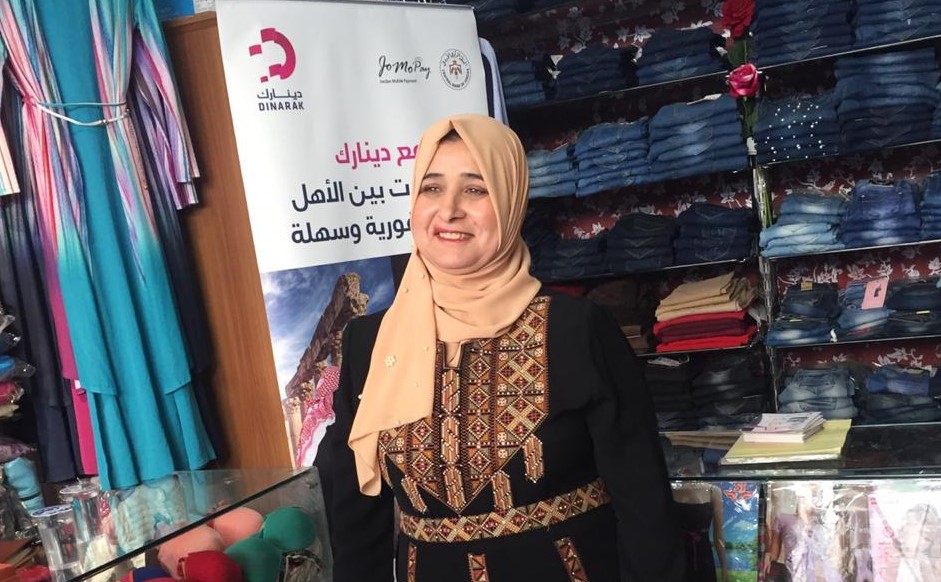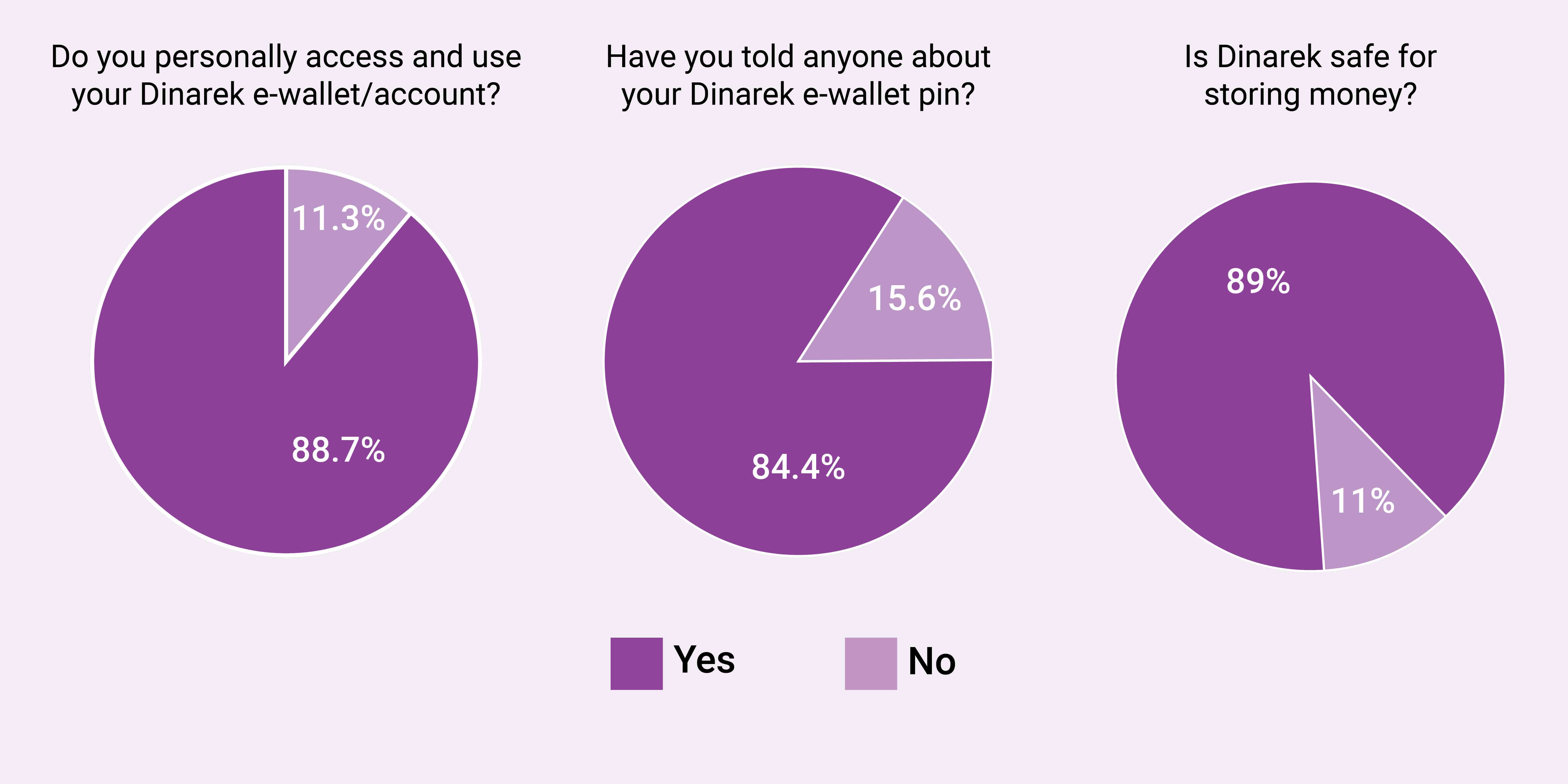May 29, 2019 | by Sabal Majali, Chloe Gueguen, and Ahmed Tamimi

Jordan has one of the largest financial inclusion gender gaps in the world. Women comprise over 47% of the Jordanian population, yet they remain largely underrepresented in most economic activities. Only 16.2% of the employed workforce in Jordan are women, one of the lowest female labor force participation figures in the MENA region. Same is the case for women’s access to finance: less than one in three adult women (27%) have a financial account (versus 56% for men). However, in a country where the mobile phone penetration rate is almost 150%, digital finance presents an opportunity to close the financial inclusion gender gap.
About the Female Agent Project
The Female Agent Project, implemented by Arab Women’s Enterprise Fund (AWEF) in partnership with Dinarak, a leading payment service provider in Jordan, aims at catalyzing access to digital financial services (DFS) among underprivileged women through a network of female agents. During the 12-month long partnership, 30 female-owned businesses were selected to sign up to become Dinarak’s agents. A dedicated team has been assigned by Dinarak to provide trainings and continuous support to their agents.
AWEF expected that increasing female representation in non-traditional roles, such as mobile money agents, would help empower women entrepreneurs whilst also providing women in their communities with access to mobile money solutions, such as payments, savings, credit or insurance. AWEF provided technical assistance to Dinarak and shared the cost of a marketing campaign to expand e-wallets outreach among women in underserved areas across Jordan.
The marketing and training activities as part of the pilot included a redesign of Dinarak’s brochures and launch of a social media video campaign explaining how women can use e-wallets on a daily basis for bill payments, money transfers, online purchases and savings. As a result of these marketing activities, Dinarak has registered an additional 12,309 female e-wallet users against a target of 3000 female clients during the year of the partnership.
This blog highlights key takeaways from the pilot as well as findings from a recent survey of 523 active female e-wallet users, conducted by AWEF to capture early impacts of e-wallet usage on women's economic empowerment, both in terms of increased net income (access), voice, choice and control over financial resources (agency). Below, we highlight key findings from this survey.


Queen Maxima meeting with Hana, one of the 30 women selected to join the Dinarak Female Agent
AWEF will continue to observe long-term effects of this intervention on women’s economic empowerment. These early findings suggest that women’s access and use of digital financial services can positively impact women’s ability to control their finances. Yet, to ensure women can fully reap the benefits of DFS, it is important that payment services providers do not only focus on increasing accessibility (via a female agent networks for instance), but also on raising women’s awareness and understanding of DFS and good financial management practices, via marketing or training activities.
Sabal Al Majali works as a Lead Market Analyst for the Arab Women’s Enterprise Fund (AWEF). Sabal co-leads AWEF's Financial Inclusion (FI) program in Jordan, including designing and developing the FI program strategy, focusing on catalyzing access to digital financial services (DFS) among underprivileged women. Sabal holds a bachelor’s Degree of Industrial Engineering from the University of Jordan.
Chloé Gueguen is a digital finance specialist and a relentless advocate of leveraging 'Fintech' innovations to create meaningful financial solutions for low-income people, especially poor or disadvantaged women. As a Lead Market Analyst for the Arab Women’s Entreprise Fund (AWEF), Chloé co-leads AWEF's Financial Inclusion (FI) program in Egypt, which involves designing the FI program strategy, identifying opportunities to work with digital finance stakeholders and piloting innovative development approach to accelerate women’s economic empowerment by giving them greater access to - and agency over - financial services in Egypt. Chloé also works as a part-time consultant for the IFC/World Bank Group, where, as part of the « MENA Banking on Women » Program, she advises financial institutions to better cater to the women’s markets in Morocco and Tunisia. Chloé holds a Canadian MBA from Laval University, and a French Master degree from Toulouse Business School.
Ahmed is a monitoring and evaluation specialist. His work experience spans 15 years in economic and market research and analysis within the MENA region. Ahmed has led and took role in several enterprise surveys and MSMEs financing for the World Bank and the IFC. In the past, he led and participated in impact assessments and evaluation studies for several programs like: MOPIC/EPP, USAID/INJAZ and Youth Finance Program/FINCA and the EU/JEDCO SME program. In his current role, Ahmed leads AWEF on the development of a detailed and robust MEL system, including defining and operating the results framework for market systems programs and other results measurement tools which meet DFID’s standards. Ahmed has earned his MA degree in Economics from the University of Waterloo, Ontario, Canada.
Categories: Financial Inclusion Technology Women and Girls English Blog Womens Economic Empowerment Blog WebinarsBlogs

1621 North Kent Street, Ste 900,
Arlington, VA, 22209
P 202.534.1400
F 703.276.1433
Website Photos: © mari matsuri
